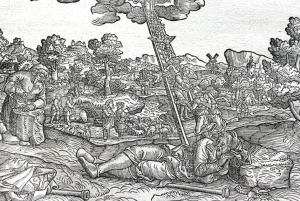 We are obsessed with power, but the story of Jesus begins in the corridors of powerlessness—in the Jewish temple, though not among the hustle of priests and the din of the Pharisees’ discussion of Torah, but at the seemingly insignificant fringes of Jewish life, in the world of widows and old men. The scene is prompted by the appearance of peasant parents from Galilee who are so poor they can’t afford the offering of sheep for purification after the mother gives birth; this peasant couple brings only two turtle doves (Leviticus 12:1–8). Yet the simplicity of their offering cannot keep others from gathering to celebrate the occasion—not elite priests and influential Pharisees, but socially insignificant types, including an old widow and an old man.
We are obsessed with power, but the story of Jesus begins in the corridors of powerlessness—in the Jewish temple, though not among the hustle of priests and the din of the Pharisees’ discussion of Torah, but at the seemingly insignificant fringes of Jewish life, in the world of widows and old men. The scene is prompted by the appearance of peasant parents from Galilee who are so poor they can’t afford the offering of sheep for purification after the mother gives birth; this peasant couple brings only two turtle doves (Leviticus 12:1–8). Yet the simplicity of their offering cannot keep others from gathering to celebrate the occasion—not elite priests and influential Pharisees, but socially insignificant types, including an old widow and an old man.
Simeon is described with unusually lavish language.
Now there was a man in Jerusalem whose name was Simeon; this man was righteous and devout, looking forward to the consolation of Israel, and the holy spirit rested on him. It had been revealed to him by the holy spirit that he would not see death before he had seen the Lord’s messiah. Guided by the spirit, Simeon came into the temple. (Luke 2:25–27).
This old man, though invisible to the powers-that-be, was inspired. The author of the Gospel is beside himself: three times, in rapid-fire succession, Luke tells us that the spirit had a hand in this tender scene.
When Simeon sees the peasants’ child, he takes the baby—this is one of the most poignant details in early Christian literature—in his arms and praises God.
Lord, now lettest thou thy servant depart in peace
according to thy word.
For mine eyes have seen thy salvation,
Which thou hast prepared before the face of all people;
To be a light to lighten the Gentiles and to be the glory of thy people Israel. (Luke 2:28–32)
These are familiar words. During my Cambridge days, every time I attended chapel at Christ’s College, I heard these words: “Lord, now lettest thou thy servant depart in peace.” Yet only recently have I grasped the power of Simeon’s song to teach us about the holy spirit.
Simeon’s song, though it seems extemporaneous and unplanned, is in fact deliberately suffused with the dream of the Old Testament—Isaiah 40–55 to be exact. If his song were a jigsaw puzzle, and every phrase of it a separate piece, you would likely discover that each piece of the puzzle is a snippet of Isaiah 40–55.
Simeon’s belief that this salvation will be “a light for revelation to the nations” takes us to Isaiah 42:6, “I have given you as . . . a light to the nations,” and Isaiah 49:6, “I will give you as a light to the nations, that my salvation may reach to the end of the earth.” Even Simeon’s belief that this salvation is also “for glory to your people Israel” echoes Isaiah 46:13: “I will put salvation in Zion, for Israel my glory.”
When we realize that Simeon’s song is a collage of words and ideas originally lodged in Isaiah 40–55, we learn something important about the holy spirit. Simeon, who receives guidance and revelation because the spirit rests on him, is a figure of epic inspiration. We know nothing else about him—except that he was a student of the book of Isaiah. Simeon’s devotion to the study of scripture has paved the way for the guidance of the holy spirit
Simeon is ripe to lift this peasant son in his arms because the whole of his being is saturated by the prophetic vision of Isaiah 40–55. Simeon is inspired, in other words, because he is vigilant, because he is regular in devotion, and because he has studied the poignant prophecies of Isaiah 40–55, which he now sees taking shape in a very young Galilean boy who will be a light to the nations, who will offer salvation to all the world’s peoples.
If you want an actual model for receiving the guidance of the holy spirit, look right here. Experience of the holy spirit rises from regular devotion, with an eye toward that single significant moment when all that we have studied will come together, and we will recognize—perhaps just this once—the long-awaited yet unexpected salvation of God, as surprising as a Nazarene baby carried to the temple, two turtle doves in tow, by his peasant parents. I would give a thousand onslaughts of the spirit for one moment of such inspired clarity.
_____________________________________________________________________________________________________________________________
Adapted from Fresh Air: the Holy Spirit for an Inspired Life, pages 69-74.












